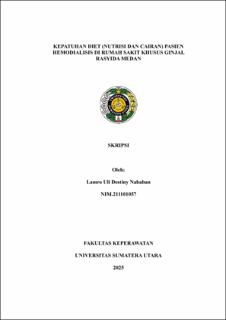Kepatuhan Diet (Nutrisi dan Cairan) Pasien Hemodialisis di Rumah Sakit Khusus Ginjal Rasyida Medan
Adherence to Dieting (Nutrition and Liquid) in Hemodialysis Patients in Rasyida Special Kidney Hospital

Date
2025Author
Nababan, Lamro Uli Destiny
Advisor(s)
Sitohang, Nur Asnah
Metadata
Show full item recordAbstract
Chronic Kidney Disease (CKD) is an incurable condition characterized by the progressive decline of kidney tissues and functions, requiring kidney replacement therapy. Hemodialysis (HD) is long term treatment for CKD patients, demanding strict adherence to ensure effective disease management. Adherence refers to the extent to which patients follow dietary and fluid intake recommendations provided by healthcare professionals. The objective of the research is to identify the adherence to nutrition and liquid intake among hemodialysis patients at Rasyida Special Kidney Hospital, Medan. The research uses as descriptive research method with a cross-sectional approach. The sample are 75 patients, taken by using purposive sampling technique. The characteristics of respondents in this hospital are as follow: 23 respondents (30.7%) are 56-65 years old, 44 respondents (58.7%) are males, 53 respondents (70.7%) are married, 34 respondents (45.3%) are Senior High School graduates, 49 respondents (65.3%) are unemployed, and 30 respondents (40%) have undergone HD treatment for less than one year. The result of the research indicates that the percentage of the answer “No” is mostly found in the items of questions about the frequency of consuming the resource of calcium supplement (96%), the measurement of consuming animal protein resource (72%), the measurement of consuming carbohydrate source (68%), consuming plant based-protein sources (62.7%), and body weighing (57.3%). It is also found that 57 respondents (76%) are at the highest level of adherence. It is recommended that the healthcare providers, especially nutritionist and nurse enhance education and counselling efforts for HD patients about the importance of adherence to nutrition and liquid dieting and provide accompaniment intensively for patients with low adherence levels.
Collections
- Undergraduate Theses [1279]
